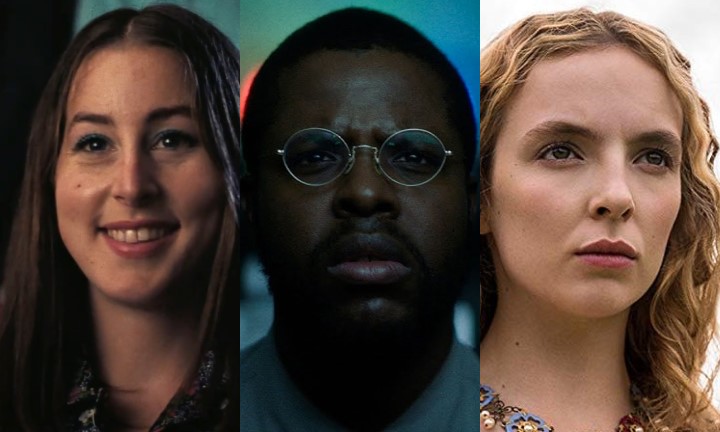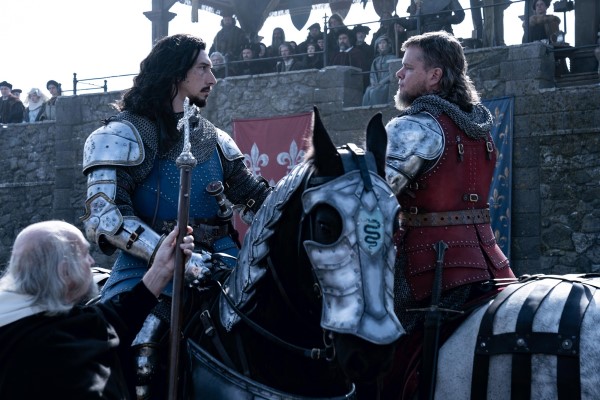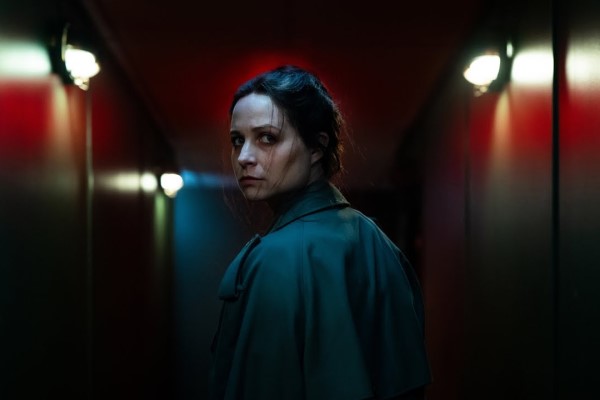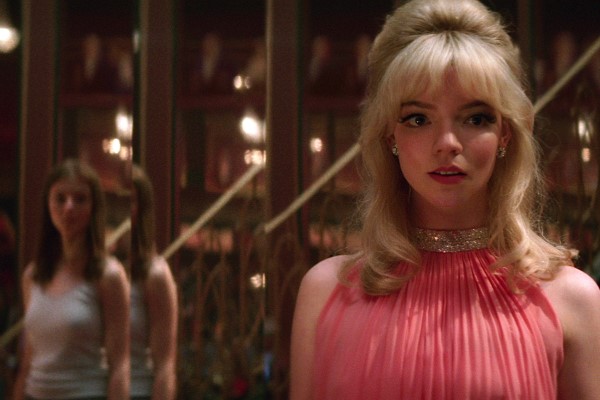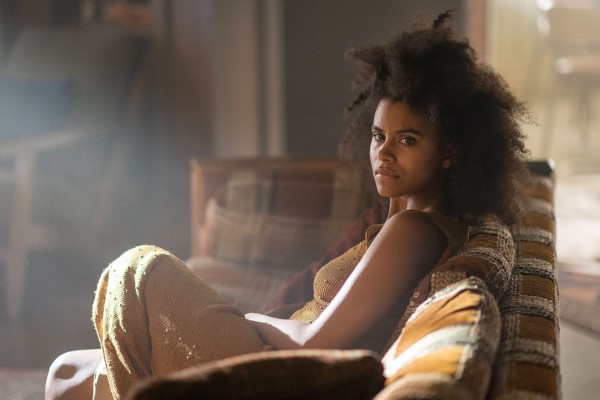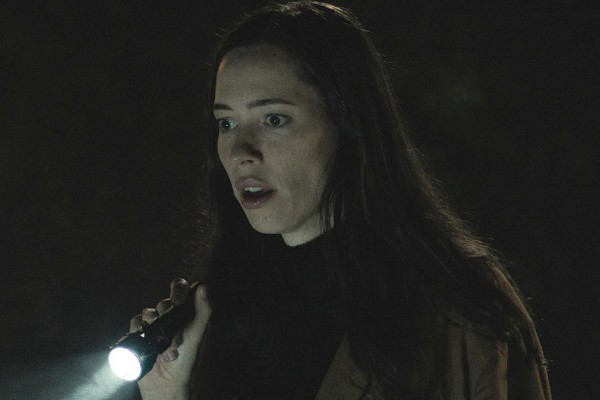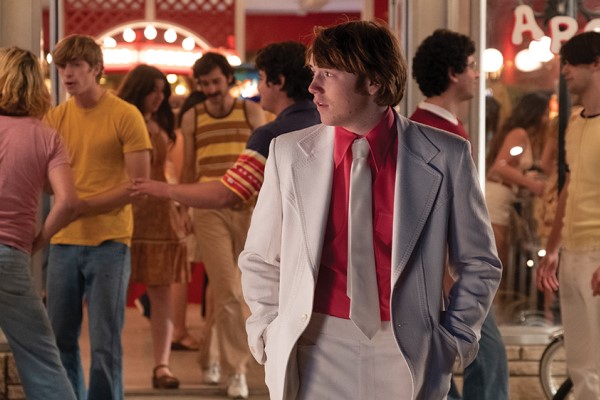If you’re actually reading this introduction and haven’t already started scrolling through the list, know that I’m damn proud of you. Because this is where I offer the usual disclaimer: This is not a definitive list by any means. These may not necessarily be the “best” movies that hit theaters in the last year, but they were certainly the ones that I liked the most.
But enough preamble. Here are my Top 10 Movies of 2021.
10. Old
Why not start the list with a bang? Old‘s 50% score on the Tomatometer may lead you to believe that the film is “bad.” But Rotten Tomatoes measures consensus, not quality. And if 50% of people like something and the other 50% do not, can you objectively say whether that something is good or bad? For me, that Tomatometer score made Old even more tantalizing as someone whose butt was already going to be in a theater seat opening weekend because of M. Night Shyamalan’s presence behind the camera. After losing the thread with big budget misfires like The Last Airbender and After Earth, Shyamalan has returned to his roots, telling small-scale stories about fractured families and the extraordinary circumstances that fortify their bonds. Old is no different, trapping a family on a beach that accelerates the hands of time, turning their bodies against them and subjecting them to the horrors of getting old. The metaphor is not subtle — and Shyamalan seems to relish forcing the audience into situations where they don’t know whether to laugh or scream — but it’s tender and touching when it counts.
Writer(s): M. Night Shyamalan
Director(s): M. Night Shyamalan
9. The Last Duel
Jodie Comer delivers not one but three different performances in The Last Duel, each adding a layer to the one that came before it as the story unfolds Rashomon-style from the distinct perspectives of each of the three principal characters. It culminates in a suitably brutal climax that delivers on the promise of the title, but The Last Duel is less about the two men fighting to the death and more about the woman whose own life hangs in the balance. Set in 14th century France, the film hinges on an accusation of rape, made by the wife of a squire (Matt Damon) against a knight (Adam Driver) who was once a friend to her husband. The knight denies the charge, making the case it was consensual and dismissing her rejection of his advances as “the customary protests.” The squire, in a thinly veiled bid to mend his wounded pride, turns the accusation into an opportunity to publicly exact revenge against his former friend for a myriad of perceived slights. It’s Comer who, by design, steals the movie right out from under Damon and Driver as a woman whose trauma is co-opted by two men who see it as a means to further their own ends.
Writer(s): Nicole Holofcener & Ben Affleck & Matt Damon
Director(s): Ridley Scott
8. Censor
Prano Bailey-Bond’s directorial debut turns back the clock to Britain circa 1985, when a moral panic had consumed the U.K. due in part to the proliferation of the “video nasty” — low-budget horror films on video cassette that provoked a media frenzy. Fearing that the violence and gore of video nasties would inspire real-life horrors, a strict code of censorship was imposed for video releases, with some films even earning the distinction of being banned from distribution. Enid Baines, a censor for the British Board of Film Classification, has no reservations about her role as a self-appointed moral arbiter, though her icy and unflinching demeanor while reviewing the latest blood-soaked cinema schlock suggests she herself is a bit too comfortable watching on-screen atrocities. But when a chilling sequence from a video nasty bears an eerie resemblance to a traumatic event from her childhood, Enid becomes obsessed with finding the director responsible as she begins to lose her grip on what separates fiction from reality.
Writer(s): Prano Bailey-Bond & Anthony Fletcher
Director(s): Prano Bailey-Bond
7. Last Night In Soho
Edgar Wright’s dark Valentine to London, the Soho neighborhood, and the Swinging Sixties shares DNA with Roman Polanski’s London-set psychological thriller Repulsion and is unabashed in its affection for the works of Giallo horror maestro Dario Argento. The set-up is unmistakably influenced by Suspiria, with a precocious aspiring fashion designer venturing far from her rural home to study at the London College of Fashion. Feeling overwhelmed by city life and alienated by the cruelty of her classmates, she retreats into the comforts of the past — literally. Finding herself able to travel back to Soho in the 1960s, which she experiences through the eyes of an aspiring singer, nostalgia for the Swinging Sixties becomes like a drug, at least until the dark underbelly of that period sinks its claws into her. While not everyone will be on board with a third act that is decidedly messier than the picture perfect set-up of the first two acts, Last Night In Soho is a showcase for Wright’s undeniable technical talents, featuring a show-stopping dance sequence at the Cafe de Paris that is a marvel of choreography and practical camera work.
Writer(s): Edgar Wright & Krysty Wilson-Cairns
Director(s): Edgar Wright
6. Red Rocket
Having said sayonara to his Texas hometown years ago to embark on an adult film career that has since stalled, leaving him penniless, Mikey is down but not out when he shows up on the front doorstep of his estranged wife Lexi, hat in hand and begging for a place to sleep until he can get back on his feet. With nothing but the clothes on his back, $22 in his pocket, and a black eye that he attributes to getting beat up by a pair of homeless men, Mikey’s tail is firmly between his legs but he is anything but humbled. This is a retreat, not a surrender, and it isn’t long before Mikey sets his sights on a freckle-faced, 17-year-old donut shop employee he believes to be his golden ticket back to the promised land. Mikey is a narcissist for whom every relationship is transactional and even the smallest gestures — like purchasing an ashtray for his mother-in-law — are calculated moves that serve his own interests. It’s a career-best performance for Simon Rex, who is so affable that you almost forget what a loathsome creature Mikey is.
Writer(s): Sean Baker & Chris Bergoch
Director(s): Sean Baker
5. Nine Days
Edson Oda’s feature directorial debut peels back the curtain on life before life, during which a former member of the living (Winston Duke) interviews a collection of souls to decide which of them will get the privilege of being born into the world. Duke’s casting is a stroke of genius. At 6’5”, he casts an imposing physical presence. But in Nine Days, his hardened exterior belies a warm and gentle interior that is carefully guarded, bearing the scars of a harsh and unforgiving world that was not kind to him in life. That lived experience colors the criteria by which he determines whether a soul is fit to be born or not. He is not looking for a soul who will thrive, but rather a soul who will survive. That is, until one of his candidates (Zazie Beetz) challenges his selection process, confronting him with uncomfortable truths about the judgements he passes on the souls under consideration and even his perceptions of his own life. It’s a stunning debut for Oda and a clear indicator Duke has clearly only scratched the surface of his potential.
Writer(s): Edson Oda
Director(s): Edson Oda
4. The Night House
What do we owe the people with whom we choose to share our lives? And if we share with them our pain and sorrow, how much of that burden can we expect them to bear? These are the questions at the heart of The Night House, which features one of the best performances of Rebecca Hall’s underappreciated acting career. Hall effectively carries the film as Beth Parchin, a schoolteacher whose husband takes a boat out on the lake outside their home and commits suicide with a handgun, leaving behind a cryptic note that raises more questions than it provides answers about his motives. Beth is grief-stricken but never wallows in her grief. She senses everyone walking on eggshells around her and responds with the grace of a bull in a china shop, at one point using her husband’s suicide to cut the legs out from under a helicopter parent fishing for a better grade for her son. So when a supernatural presence begins tormenting her, pointing in the direction of disturbing secrets her husband may have left buried, Beth digs in without hesitation, hoping the truth will set her free from the shadow his death has cast over her life.
Writer(s): Ben Collins & Luke Piotrowski
Director(s): David Bruckner
3. The Matrix Resurrections
As much as the original is revered as one of the most groundbreaking action films of the 20th century, The Matrix has always been a love story at its core. After all, it’s a kiss from Trinity that seals Neo’s destiny as The One. So it should come as no surprise that a fourth installment in the franchise, nearly 20 years after a polarizing conclusion to the original trilogy, would provide us an epilogue to their tragic romance — even if said conclusion ended with both of them dead. Both are very much alive in The Matrix Resurrections, though I won’t spoil how or why in the context of the film. As the movie elucidates in a scene that makes no attempt to mask its meta commentary, Neo and Trinity are back because they are valuable IP to Warner Bros. But Lana Wachowski, one half of the sibling filmmakers who built the franchise, takes the opportunity to re-claim a story that has been co-opted by bad actors over the last two decades, delivering a sequel that dares to question our desire to cling to the past out of fear of the future.
Writer(s): Lana Wachowski & David Mitchell & Aleksander Hemon
Director(s): Lana Wachowski
2. The Green Knight
Would you rather die with honor or live with shame? This is the question at the heart of David Lowery’s filmed adaptation of the 14th century chivalric romance Sir Gawain and the Green Knight. In a split from the source material, the Gawain of the film is not yet a knight, but is instead the impetuous nephew of King Arthur. The heir to the throne, Gawain is destined for greatness through his lineage alone, but even he doubts whether his character merits the crown. After engaging in a fateful Christmas game with the Green Knight, Gawain embarks on a journey that forces him to reckon with his own moral shortcomings and decide what kind of man he wants to be. Much like Greta Gerwig’s Little Women, Lowery’s The Green Knight is an adaptation that is in conversation with its source material, pointing out the contradictions in its story. The film culminates in one of the most stunning sequences of the year, a wordless montage that reshapes our perception of what it means to be a hero in Arthurian lore.
Writer(s): David Lowery
Director(s): David Lowery
1. Licorice Pizza
Paul Thomas Anderson’s latest sojourn back to the San Fernando Valley of the 70’s is about so much — attraction, longing, and the pursuit of purpose, to name a few — that I don’t even know where to begin, so I’ll hone in on the incredible debut performances of Alana Haim and Cooper Hoffman. Alana is 25 years old living at home with her parents, betraying her own insecurities about her station in life by giving voice to her older sisters’ unspoken judgments. She has what amounts to a meet cute with Gary, a cocksure high schooler aging out of his career as a child actor. He never stops long enough to dwell on his failures, moving from one business idea to the next with the boundless ambition of a budding entrepreneur and the false confidence of a small-time hustler. Naturally, Alana is charmed by his resilience in the face of rejection, and being the object of his attention has a certain appeal she’d never admit to. Through a series of episodes punctuated by appearances from Sean Penn, Bradley Cooper, and a scene-stealing Harriet Harris, Alana and Gary explore different avenues in search of the validation they crave, trying to deny the magnetic pull between two people who need each other more than either is willing to admit aloud.
Writer(s): Paul Thomas Anderson
Director(s): Paul Thomas Anderson
Just a Bit Outside (in alphabetical order): Army of the Dead, C’mon C’mon, Dune, Judas and the Black Messiah, King Richard, Malignant, Passing, Pig, The Power of the Dog, Spencer, Spider-Man: No Way Home, The Suicide Squad, and Titane
